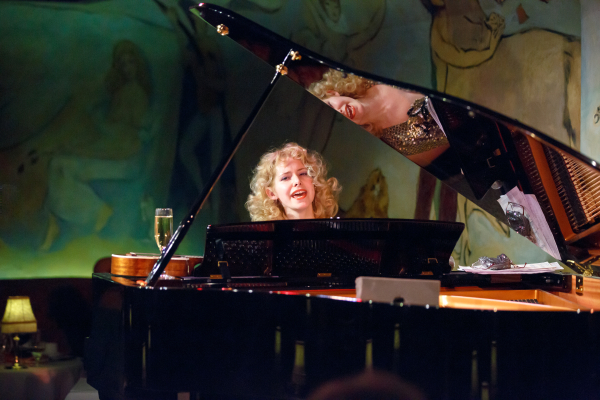Nellie McKay: Nellie With a Z
The old and the new dance a strange and thrilling ”pas de deux” in the singer-songwriter’s Café Carlyle debut.

(© Michael Wilhoite)
The star of the evening emerged from behind the bar, doddering slowly through the dining room like an 89-year-old weighed down by the burden of decades of showbiz memories. No, it wasn’t Elaine Stritch, returning triumphant to Café Carlyle. It was 31-year-old Nellie McKay, making her Carlyle debut in Nellie With a Z. For a little over an hour McKay infused the Great American Songbook with a quirky hipster ennui that was at once non-threatening and subtly subversive.
"It’s so nice to be back at Feinstein’s," she said in her opening moments before launching into Walter Donaldson and Harold Adamson’s "Did I Remember?" from the 1936 Cary Grant-Jean Harlow drama "Suzy." Her ghostly voice will sing you into another era. She’s like listening to Jonathan Schwartz in a haunted house.
McKay is a one-woman juggernaut. She accompanies herself on the piano and ukulele. She tickles the ivories with the greatest of ease, drawing out the kind of improvisational jazz riffs that were always meant to echo off the painted walls of Café Carlyle. She gives fresh life to old standards like Mercer & Carmichael’s "Skylark" and the Fats Waller/Harry Brooks/Andy Razaf collaboration "Black and Blue." "What did I do to be so black and blue," she sings in her wispy-yet-crystal-clear voice. Later she strums out a sotto voce rendition of "Rio De Lua" ("Moon River" in Portuguese) that is sweeter and softer than any lullaby.
Her onstage persona is at once ancient and infantile. With a lilting mid-Atlantic accent and hair teased into a halo around her head, McKay feels like she could have walked off the set of an MGM film circa 1937. Yet every moment of her performance is endowed with a wide-eyed innocence. "I invented Broadway in 1523," she told us earnestly before banging out the familiar strains of "Broadway Melody." "That was written for me by Gershwin or Berlin or Victor Schertzinger." (It’s by Arthur Freed and Nacio Herb Brown.)
McKay also performs many of her own songs like "Manhattan Avenue," "I Will Be There," and the oh-so-topical "Russky Rap," which includes references to the Sochi Games and gay rights in Russia. Her songs are melodic and lyrically complex, rarely slowing down long enough for you to wrap your head around a wicked turn of phrase before she blindsides you with another.
Her inter-song banter is similarly hit and run: "My TV kept talking about the war on terror, but everyone knows that war is terror," she flatly states before plowing into "Toto Dies," a song that couches lyrics like, "Yeah I'll have my coffee black / Hey look we're bombing Iraq," with the "Oo-ee-oo" chant from the Wicked Witch of the West’s castle guard.
Cabaret is so personal and can often take the form of a confession from performer to audience. We expect a certain amount of autobiography. McKay indulges that desire with faux memories like, "I first came to the Carlyle with Alan Rickman, who always sent the wine back. What a bore." This "back story" does nothing to reveal the woman behind the armored suit of sequins and hairspray, beyond the fact that she has a puckish sense of humor, a keen sense of politics, and a uniquely beautiful voice: This is the very essence of exciting cabaret.









